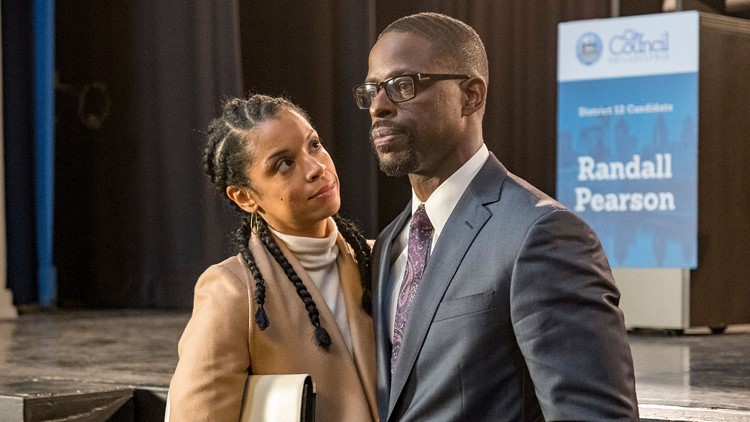There was a time when fans of NBC's "This Is Us" thought the show would lose a step after the show revealed the exact fate of Jack Pearson (Milo Ventimiglia). When you create the world's best dad, no one wants to see him go, and few were ready for the revelation of his demise. For creator Dan Fogelman, the challenge was to keep the show thriving after the season two finale.
With season three wrapping up last week, Fogelman succeeded and then some.
How did the show pull this off? For the first two seasons, every time-traveling nugget was aimed at giving us clues and making our mouths water with regards to Jack's fate. However, as Fogelman and his writing team did that with precise dedication, they were showing us glimpses of the Pearson family that we weren't paying attention to.
Many forget season two ended with an old Randall Pearson (the super Sterling K. Brown) showing up to meet his daughter and "go see Mom." After Jack's fate was revealed, this became the new mystery game for hardcore fans of the show. What happened to make Randall look so sad? Who was sick, dying or in need?
Season three covered many things, both new and old. Some plot points were dusted off for fresh power, such as Kevin's (Justin Hartley) battle with sobriety. Kate (Chrissy Metz) and her struggle to get pregnant with Toby (Chris Sullivan) was a new feature that gave Metz and Sullivan new avenues to stretch their acting talents. Randall and Beth's (Susan Kelechi Watson) marriage was put to the test, leaving many to wonder if the finale would reveal them divorced or separated.
Here's the thing, 98% of writers and series creators would fumble a show that deals with so many flashbacks. They would lean on one time period too hard, or just move around so much, the characters would become stop signs and highway exits instead of true rest stops. Fogelman takes each episode, though, and connects the present day back to the Pearson siblings' childhood with a key ingredient stored inside. Season three's final hour dealt with Rebecca Pearson (the phenomenal Mandy Moore) getting into an accident when the kids were young, and it eventually tied to the present in the end.
Fogelman's writing, methodology with the show and his overall establishment of order allows each hour to serve the purpose of hitting you in the heart while dialing up your brain for the big picture at the same time. It's a wicked art.
Part of that talent allows every character to remain involved in the storyline. With most shows, when a character gets killed off, they are gone except for an episode or two down the line. Or it's a cliched ghost sequence that falls flat so often because so many shows have tried it. Since he is dealing with a story that takes place over the course of 30-plus years, Fogelman has a lot of space to fill in.
Example: With Ventimiglia's Jack gone, Fogelman still used the actor in a key series of episodes in a season three arc involving the family patriarch's time in Vietnam. It allowed the actor to stretch while fueling a modern-day storyline with a search for Jack's long lost brother, Nick (Michael Angarano, Griffin Dunne). Previously, the audience knew very little about what happened during his time at war that led Jack to never speak about it to his family, and what severed his relationship with Nick. In the end, it serviced the plot of the moment while adding some firewood to the overall show arc.
Premature childbirth was deftly handled late in season three as well, which gave Metz and Sullivan a center stage chance to speak to something that affects thousands of families every year. After the episode aired, many fans reached out via social media about their own kids being born months early and surviving. At its core, "This Is Us" is relatable in various ways.
While his character isn't around the modern day plotline anymore, Randall's dad, William (the remarkable Ron Cephas Jones), still gets involved in an episode here and there, adding poignancy like a syrup and slice of butter aides the taste of pancakes. Supporting characters like Jack's best friend, Miguel (Jon Huertas) and the teenage actors who portray the kids (Hannah Zeile, Niles Fitch, Logan Shroyer) remain an integral part of the action.
While the ensemble powers "This Is Us", Moore has moved to the center of the show, becoming the show's heart. The actress' resume was credible before her 54 episodes here, but Rebecca has given her an opportunity to expand her skills and for the first time, anchor a story. With Jack gone, Rebecca became the true base that pushed the old timeline as well as supporting the present one. She's everywhere, and the show is better for it. Let's just say she will be the true center of season four.
The acting is the unique form of work that links an actor to that role, for better or worse. It's arguable that Hartley or Metz will ever find a role this juicy, diverse, and layered in their careers. Brown has shown a lot of range in supporting roles in movie roles in Black Panther and Hotel Artemis, but he will be linked to Randall in more ways than one.
And you know what: it's not a bad thing. Certain actors spend their entire careers searching for something this significant. Fogelman's sage treatment of the characters allows the characters to evolve with each storyline, which as I mentioned earlier, aids the actors in their need to stretch out and go for broke.
Every season seems to introduce a new mystery at its central plot line. Season four's arc is already set up, and it should be a doozy. The parts and certain elements are in place, ready to blow our minds next spring. Fogelman can make this train ride smooth for at least another three seasons because there is still so much space to fill in. Kevin's early career in Hollywood, perhaps before he made it big on the sitcom show. Randall's 20's, where he got into his first profession. Kate's college years. So much there still ready to be looked at.
The main reason "This Is Us" works so well is the way it makes you feel. Every episode leaves me in a nostalgic mood of reflection. They hit me hard because Fogelman is exploring themes that touch all our lives. Childhood, parenthood, marriage, love, loss, and the moments that we attach to all of them. It puts life, and all its ugly gray areas, on display instead of skipping over them for the good stuff. By pausing for the grim realities, the good stuff hits even harder.
I think about my mom and dad in certain hours. My role as a father and husband in another. I play the game of "what if" in many others. Great shows do that to you. They create a world with equal parts realism and fantasy to emotionally connect, creating a bond that lasts for many years after the show goes off the air.
If you haven't started watching the show, do it now. Take a week and dive in headfirst. Try not to cry, feel something, or be moved in some way. The proudest cynic will find it hard not to get wrapped up in its sweeping power. Try it and tell me if I am wrong.
"This Is Us" gets better every year, unlike most shows. It has done that thanks to its ability to thrive long after the initial plot boom of "What happened to Jack Pearson?" was presented, explored, and dealt with. There's legs in Fogelman's writing and his characters. The world is starting to open up.
I didn't plan on watching this show. After its first batch of episodes aired back in 2016, I resisted the urge to dive in. Network shows are so hit and miss that I wasn't sure. After digging in, it has become one of my favorite shows. More than anything, "This Is Us" is proving to be a power that endures.



